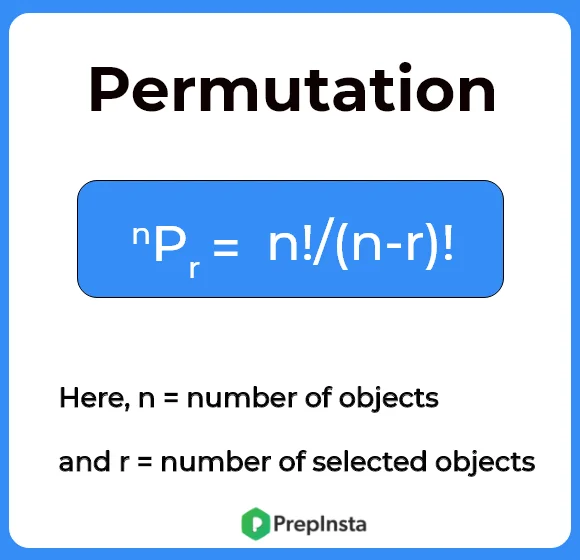Permutations in which n people can occupy r seats in a classroom in java
Which n people can occupy r seats in a classroom in Java
Our Aim is to write a Java code to find all the possible permutations in which (n) people can occupy (r) number of seats in a classroom.
Suppose (n) number students are looking to find (r) seats in a classroom so how will they do it . They will do it with simple formula which is given by
n P r = n! / (n-r)!

Problem Statement :
In a classroom some of the seats are already occupied by students and only a few seats are available in the classroom. The available seats are assumed as r and n number of students are looking for the seat. We need to find in how many different permutations n number of students can sit on r number of chairs.
Algorithm
- Input number of students in n
- Input number of seats in r
- Use permutation formula { factorial(n) / factorial(n-r) }
- Print Output

Java code
import java.util.*;
import java.io.*;
public class Main
{
public static void main(String[] args)
{
int n, r, per, fact1, fact2;
Scanner sc = new Scanner(System.in);
System.out.println("Enter the Value of n: ");
n = sc.nextInt();
System.out.println("Enter the Value of r: ");
r = sc.nextInt();
fact1 = 1;
for (int i = n; i > 1; i=i-1)
{
fact1 = fact1 * i; //calculating factorial (n!)
}
int number;
number = n - r;
fact2 = 1;
for (int i = number; i > 1; i=i-1)
{
fact2 = fact2 * i; //calculating factorial ((n-r)!)
}
per = fact1 / fact2; //calculating nPr
System.out.println(per+" ways");
}
}
Output
Enter number of people: 5 Enter number of seats: 9 Total possible arrangements: 120
For similar question click on given button.
Prime Course Trailer
Related Banners
Get PrepInsta Prime & get Access to all 200+ courses offered by PrepInsta in One Subscription
Login/Signup to comment



import java.util.*;
public class Permutatuins {
public static void main(String[] args) {
Scanner sc = new Scanner(System.in);
System.out.println(“n?????????????”);
int n = sc.nextInt();
System.out.println(“r?????????????”);
int r = sc.nextInt();
int res = fact(n)/(fact(n-r));
System.out.println(“Total No.of combinations possible: “+res);
}
public static int fact(int num) {
int res =1;
for(int i=1;i<=num;i++) {
res=res*i;
}
return res;
}
}
Permutations are defined for n items taken r at a time, and in your code, you have set r to 9, which is greater than n, which is 5. This is why you’re getting an incorrect result.
Thanks a lot for Answering, kindly join our Discord server, our mentors will guide you further there.
import java.util.*;
public class Permutation {
public static int fact(int n){
int f=1;
for(int i=1;i<=n;i++){
f=f*i;
}
return f;
}
public static void main(String[] args) {
Scanner sc=new Scanner(System.in);
int n=sc.nextInt();
int r=sc.nextInt();
int res=fact(n)/fact(n-r);
System.out.println(res);
}
}
public static int findFactorial(int number){
if(number == 0){
return 1;
}
else {
return number * findFactorial(number – 1);
}
}
public static int PermutionOfNPeopleRSeats(int people_r, int seats_n){
int denom = seats_n – people_r;
return (findFactorial(seats_n))/ (findFactorial(denom));
}
public static void main(String[] args) {
int factNumber = PermutionOfNPeopleRSeats(5,9);
System.out.println(factNumber);
}